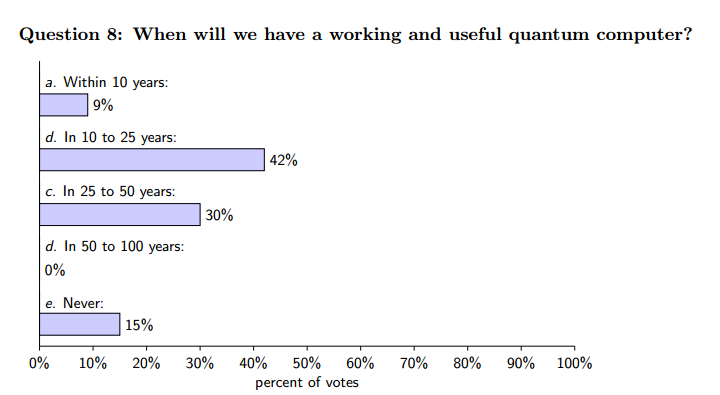Poll Reveals Quantum Physicists’ Disagreement About the Nature of Reality
Quantum mechanics lies at the heart of many modern technologies–lasers, superconductors, many forms of computing, cryptography and so on. That’s partly because the theory is so good and well tested to mind boggling accuracy.

And yet, there is trouble at the heart of quantum mechanics and the way we should use it to understand the nature of reality. Perhaps nothing reflects this better than a survey published today by Anton Zeilinger at the University of Vienna and a couple of buddies. These guys have surveyed a group of physicists, philosophers and mathematicians about their views on the foundations of quantum mechanics.
All of the participants were leading thinkers in this field so it would be easy to imagine that they would generally agree on how to interpret quantum mechanics and the foundations of physics.
Not a bit of it. Zeilinger and co put 16 multiple choice questions to 33 participants at the Quantum Physics and the Nature of Reality conference in Austria in 2011 and found that opinions diverged wildly.
For example, in answer to the question “Do you believe that physical objects have their properties well defined prior to and independent of measurement?”, 48 per cent replied “no”, while 52 per cent replied “yes, in some cases”. A further 3 per cent said “yes in all cases” and 9 per cent were undecided (respondents were able to select more than one answer).
The question “What is your favourite interpretation of quantum mechanics?” had 12 possible answers. The most popular answer was the Copenhagen interpretation with 42 per cent but 18 per cent chose the many-worlds interpretation. 21 per cent admitted to having switched their interpretation several times with one respondent writing that he sometimes switched interpretations several times a day.
The question “When will we have a working and useful quantum computer?” drew an interesting spread of responses. Only 9 per cent thought this would be possible within 10 years while 15 per cent said never. The answer “In 10-25 years” drew 42 per cent of the respondents while “In 25-50 years” drew 30 per cent.
Clearly, getting quantum physicists to agree on their topic is like herding cats. “Nearly 90 years after the theory’s development, there is still no consensus in the scientific community regarding the interpretation of the theory’s foundational building blocks,” say Zeilinger and co.
And yet “quantum theory is based on a clear mathematical apparatus, has enormous significance for the natural sciences, enjoys phenomenal predictive success, and plays a critical role in modern technological developments.”
Figure that one out!
Ref: arxiv.org/abs/1301.1069: A Snapshot of Foundational Attitudes Toward Quantum Mechanics
Keep Reading
Most Popular
Large language models can do jaw-dropping things. But nobody knows exactly why.
And that's a problem. Figuring it out is one of the biggest scientific puzzles of our time and a crucial step towards controlling more powerful future models.
The problem with plug-in hybrids? Their drivers.
Plug-in hybrids are often sold as a transition to EVs, but new data from Europe shows we’re still underestimating the emissions they produce.
Google DeepMind’s new generative model makes Super Mario–like games from scratch
Genie learns how to control games by watching hours and hours of video. It could help train next-gen robots too.
How scientists traced a mysterious covid case back to six toilets
When wastewater surveillance turns into a hunt for a single infected individual, the ethics get tricky.
Stay connected
Get the latest updates from
MIT Technology Review
Discover special offers, top stories, upcoming events, and more.